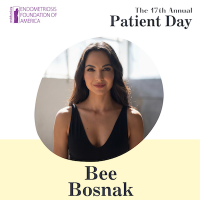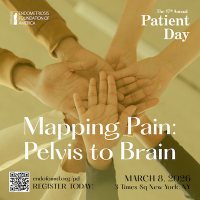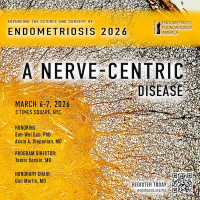Endometriosis Foundation of America 2014
Outsmarting Endo - Diagnosing Silent Endometriosis
- Jeffrey Braverman, MD, FACOG
I am Dr. Braverman and I am the Director in Braverman Reproductive Immunology. I come at endometriosis at a completely different angle than most of you have.
I know that most of the patients we heard today have pain and the problem of course is treating the pain and the emotional suffering from the pain. But what I deal with are women who have emotional pain because they cannot get pregnant or they cannot continue a pregnancy successfully. Many of the women who come to my practice are patients that have had unexplained infertility for many years. I agree with Dr. Mettler on one thing, I have the same disease that I think she has, which is I cannot say "I can't help you". It is a disease that keeps you up at night and never lets you sleep because there is always somebody that has a problem that you have not figured out. You really spend every waking moment saying I know there is a solution somewhere, we just have to find it.
So most of the patients that we treat have either never conceived at all, conceived but have early miscarriages, and many even have, unfortunately, complications in their pregnancies including toxemia, fetal growth restriction and even stillbirth. What we have learned as we have investigated - and I started out just as an obstetrician, I say just as an obstetrician but I started as an obstetrician doing deliveries. I have probably delivered about 5,000 babies in my career. I noticed a lot of my patients that were having problems with early losses were also having problems later in the pregnancy and I knew there was a connection here. When I sent them out to the local fertility centers most came back saying they could not figure it out, come back and just told me to try again. So, of course, as they always said - and everybody called me Jeff, I never used Dr. Braverman unless I am giving a talk at formal rounds - but they said, "Jeff, why don't you figure it out?" I wished they had never said that. It was 20 years ago and I have had no life since. But that is really what I did and I knew there had to be an explanation and I knew that it just cannot be these people had miscarriages and no answer. Over this 20 year time period what I have learned is that almost all of these patients that have come to out practice had some undiagnosed autoimmune disease. There is no question in my mind that endometriosis is one of them. I will go over this with you.
Just a brief overview of how we look at the embryo. We look at the embryo as nothing different than an organ transplant in the body. The same cells, the same immune cells that are involved in rejection of a kidney, the same cells that a cancer uses to evade the immune system are the same exact cells that an embryo uses to help itself get into the human body. We know that mammals are the only ones that have to carry a placenta. In the past, you know, reptiles just laid eggs and that was really easy because they could go lie on the beach for nine months and come back and the baby was there. Actually sometimes they came back and somebody ate the eggs. Through evolution they decided let us put the baby inside the mother and there had to be evolutionary changes that allowed that. One of the key changes that we discovered and this was through some great work at Sloan Kettering, was that there was a specialized cell that is only in mammals, and the gene is only in mammals, that allows for the production of a protector cell called the T-regulator cell. This cell is what helps a mammal accept a foreign genetics which is the placenta and is really the basis of just about everything that I do.
I will just take a minute and discuss what is a T-regulator cell. Basically all of us have immune cells in our body and we all have what are called naïve T-cells and I know this is very boring but I will just give you a little background so you have some idea what I am talking about. We all have naïve T-cells. These are T-cells in the body that normally help fight off infection but they have many other functions as well. But a naïve T-cell has not figured out what it wants to do yet. It is this T-cell that the pregnancy has to manipulate. The mother's immune system comes in contact with paternal genetics when you have relations through the sperm as well as once the baby is formed. Once the pregnancy is developed there are cells that are shed from the pregnancy into the mother's body and it is another way that these T-cells get direction on what to do. The T-cell involved in this is called a tolerogenic antigen presenting cell, also known as a dendritic cell. These are the cells, the messenger cells that are present in the vaginal canal. They are also present in the uterine lining and these are the cells, through specialized receptors called MHC II receptors, that pick up paternal antigen both on the sperm when they have relations and also when fetal cells begin to be shed into the maternal system.
If everything is going well, and you notice the word tolerogenic on top of that APC, and this is probably the key term in reproductive immunology because keeping these messenger cells tolerogenic, meaning, whatever antigen they pick up they are going to develop tolerance for. This is how the mother has tolerance for the paternal genetics. It is through this presentation of antigen, it interacts with this naïve T-cell and if everything goes well she forms this very critical cell called the T-regulator cell, which we can now easily identify based on a protein inside called FOXP3 protein. When those T-regulator cells form that puts the brake on the maternal immune system. The maternal immune system recognizes the fetus is being formed and it activates. But, while it is activating, if everything is going well, and I always wonder how anybody has a baby when I read this, but these regulator cells form and they interfere with the other arm of the immune system that is normally going to attack the baby. But if we get a failure in this T-regulator cell production then we are going to have prevention of conception, we are going to have early pregnancy loss as well as later complications.
All of these issues never are 100 percent, meaning that some people still get pregnant but then just have complications of an immune attack against a pregnancy, which show up as complications later in the pregnancy. Failure to generate this tolerance not only leads to cellular attack against the fetus, meaning a T-cell attack or another cell called a natural killer cell attack, but failure to generate tolerance also lasts through the production of antibodies that also can attack the pregnancy.
Where do we cross roads and how did I suddenly become involved in what I think Dr. Seckin calls his circle of game changers? And of course, I am honored that he invited me to speak today and I am a part of this. We have been noticing, and the literature is really abundant, with information that endometriosis has autoimmune components. We know that there are elevated inflammatory cytokines. These are chemicals that are released by white blood cells that cause inflammation. We have identified many of these cytokines in our studies. Most of our patients get a complete immunology work up. We measure them for every cytokine production. We measure all of their immune cells. We look at how they stimulate, what they make when they stimulate, we look at their natural killer cells. Most importantly, we look at their HLH genetics, and the HLH genetics are their fingerprint of their immune system. It tells us everything that they are predisposed to and what we began to find is that there was a certain pattern that we found in endometriosis patients that I will come back to in just a moment. We know that there is altered B-cell activity. B cells are the cells that make the antibodies. We know there is altered macrophage activity but no natural killer cells increase. Dendritic cells are those antigen presenting cells that we spoke about and we know they get modified and they leave that good tolerogenic state and they turn into that inflammatory state. And regulatory T cells, we know there is definitely altered regulatory T-cell function in women with endometriosis. We think this all plays a part in the pregnancy complications that we are seeing.
We know also that inflammation is a very important part of endometriosis and whether the inflammation causes endometriosis or whether endometriosis causes inflammation, and I think it is both, but this all plays a part in why patients end up in our practice with infertility. The majority of these patients as I said have not a single painful symptom of endometriosis. In fact, one of the first symptoms that we see is infertility and recurrent pregnancy loss and pregnancy complications.
What associations have we found? There is a very strong association with many autoimmune diseases and endometriosis, Hashimoto's thyroiditis probably being the most prevalent we find in our practice. We see Lupus, we see antiphospholipid syndrome, scleroderma, multiple sclerosis. We know again that we spoke of this HLA gene as the fingerprint of the immune system and like autoimmune diseases endometriosis we are finding has its own HLA fingerprint. We have identified at least three common HLA groupings called haplotypes that are very prevalent in women with endometriosis. I think Dr. Seckin mentioned a moment ago about evolution and why did we evolve to get endometriosis? When we look back at all these autoimmune haplotypes they really developed over time to protect the population against disease. If we go back and study these haplotype combinations in ancient times it is not a bad thing that inflammation is caused by certain haplotypes because it helped fight off the plague and helped fight off disease. It helped populations survive but now we are seeing the consequence of that with all of these autoimmune syndromes and I think endometriosis being one of them. I think that was its origination.
Some of the common ones we see, and I will not go into tremendous detail, but one of them is called the extended 8.1 haplotype. This is a haplotype that is common in about, or it accounts for about 90 percent of all autoimmune disease and when I see this my suspicion is piqued very quickly that this patient may have endometriosis, at least associated with her infertility. We know that celiac disease is part of this haplotype. All of you know when we start cutting gluten out of the diet that patients start getting a tremendous benefit symptomatically. In fact I have patients with this and I just tell them to stop gluten. They had no symptoms and they usually call me back and say, "You know, I didn't realize how bad I was feeling till I cut the gluten out of my diet. Now I feel great". Gluten is a very processed foreign antigen in this country and women with these autoimmune haplotypes that are consistent with endometriosis they react even more strongly to foreign antigens and gluten being one of them, so I get them all off gluten immediately.
The other haplotypes that are associated antiphospholipid syndrome, Hashimoto's, autoimmune hepatitis, but what we found over all of them, we began looking at all of the haplotypes of endometriosis, is that it seems to be more antibody mediated. There are two arms to the immune system; there is the cellular arm of the immune system - we spoke about the T-cells, we spoke about the natural killer cells, and there is the antibody arm of the system. And they are numbered, once called the TH1, that means it is a cellular attack, one is called the TH2 and that means it is an antibody attack. Every time you look at all of the immune parameters in these patients it is almost always consistent with a TH2 or an antibody mediated stated and I think that is why we see such strong associations of endometriosis with all of these TH2 type of states, lupus, antiphospholipid syndrome. We wondered why does this happen? When we looked at the exact HLA haplotypes that are involved in endometriosis we find out that when these messenger cells, the antigen presenting cells, interact with foreign antigen, in this case it is paternal genetics on the embryo they trigger the release of these inflammatory chemicals we spoke about those inflammatory cytokines. The most prevalent are Interferon gamma and interleukin 17 and we know that these are potent mediators today of many autoimmune diseases.
We spoke about the evolution that this was very important years ago to help protect us because these inflammatory cytokines activated the immune system and helped to fight off disease, today though they just wreck havoc. We have vaccines to help us with diseases we do not need these anymore. These types of haplotypes because eventually self-antigen, antigen that is part of your own body, will eventually interact with these antigen presenting cells long enough that eventually women will get autoimmune disease. But, if they react to self-antigens so strongly, imagine how they would react to foreign antigen like a paternal antigen in a pregnancy? This is one of the reasons why we see these patients so much earlier than our great surgeons do, because they do not have any symptoms yet but they are showing signs that they have the HLA haplotypes by rejecting the pregnancies and this is how they end up presenting to our office.
This was sort of a diagnosis that I stumbled into as we began compiling all of our data. So we came up with this term silent endometriosis and I am sure the term has been out there, I do not think I made it up but that is what I call it. The funny thing is, it is silent to most people but to me it just screams. Because when I see these symptoms I know these patients have endometriosis and I began referring them to our great surgeons. I remember when I sent out to Dr. Seckin our first case he called me up and said, "Jeff, this patient doesn't have any symptoms". I said, "Just take a look". I remember that he went in, and this was one of our patients at stage four endometriosis, and after of course brilliant surgery for the first time in her life she is now pregnant with twins.
So, what do we find, what do we categorize as silent endometriosis, what do I look? Because when these patients present to me they have either failed multiple in vitro fertilization cycles, they cannot get pregnant at all or they have suffered recurrent losses. I begin looking for reasons. Of course I do my full endocrinological profiles I go through everything that most infertility specialists go thrpugh. I never get the patients who come to me for the first time saying ‘I need to get pregnant'. I get them only if they have failed multiple therapies at other centers and we are a referral center for centers around the world that send us these patients. I guess an interesting thing that I had no idea of is that nobody really began to broach this issue anywhere in the world. When we began publicizing what we do I think I spent practically every waking hour answering emails from patients in every corner of the world because the immunologists are very focused on transplant immunology and cancer research and rheumatology. In obgyn, how many days of immunology were we taught - none. I had to literally go out and teach myself an entire field before I could even begin to tackle these issues. Then, of course, I hired an immunologist to work with me to make me look even smarter but these are the things we began to look for.
Obviously family history, I cannot believe how many women walk in and they have gone through IVF cycle after IVF cycle. I begin talking about endometriosis and they say, "Well my mother had it, my sister had it" and yet nobody thought of looking because she had no symptoms. Family history, obviously very important. Remember again, we are looking at the HLA haplotypes, which are inherited genetics it is not surprising that there is an inherited form of endometriosis. The next thing we start seeing is a pattern of women who show up to me who are young and who have unexplained egg quality issues, unexplained poor outcomes with IVF, unexplained low AMH (Anti-Mullerian Hormone that tells us the ovarian reserve), unexplained elevations in FSH and nobody thought to look at this. They go through cycle after cycle. I usually ask my patients what they thought the cause was of their low AMH at 32 years old and they said, "They just said it happens".
What we found in these situations are that young women with low ovarian reserve typically have one of three reasons; it is familial, it is genetic and we see that. The mother went into menopause early, they may do that, it is genetic. The second is it is autoimmune that there is an autoimmune attack against the follicles called autoimmune oophoritis and we can easily identify that. But number three is almost always endometriosis. It is an inflammatory environment in the pelvis and we all know these peritoneal fluids are saturated with inflammatory cytokines. We know that the follicles that are generated during IVF when they look inside the follicular fluid they have very high levels of prodigal reactive oxygen species, a by-product of oxidative stress, a by-product of all these elevated cytokines in the pelvis, and we know this affects eggs.
When we do IVF sometimes we will look at the eggs of the IVF and we will see they have a brown discoloration. That is a great hint that there is endometriosis on the ovary. In studies when they have measured the ROS inside the follicular fluid in endometriosis patients they are very high. ROS is not a bad thing, you need some. You need low levels of ROS for proper egg maturation but in patients with endometriosis these levels are very high. This affects the mitotic division of the egg and is one of the reasons why these women have poor embryo quality when they go through IVF. Or if they have never made it to IVF one of the reasons why they are not getting pregnant is because the egg quality, the embryo quality, is just not good.
The next thing I began to notice and I use color Dopplers when I do my sonograms, there are two things I notice when I do the sonograms: One Dr. Mettler brought up this morning is adenomyosis. It has got a really classic finding on a sonogram and when I put the sonogram in it just lights up sometimes and I know, before I do anything else, these patients probably have endometriosis. There are not too many patterns that are particular unless the patient has had surgery or some other scarring but with no other cause or etiology, most of the time these patients have adenomyosis and most likely have associated endometriosis. Going along the lines of pelvic inflammation I began looking at the resistance of the blood flow through all the pelvic vessels. It is just a clear pattern that I always found that these patients with endometriosis had extremely high resistance to the blood flow, both to the uterus and the ovaries, it is a classic pattern. The blood sometimes would not even go into the vessel it would just come the opposite way. We call this reverse flow and if I saw this pattern again I knew there something causing pelvic inflammation. It does not necessarily have to be endometriosis but when it fits the rest of this picture it almost always is.
Again, we look at the AMH, we look at the FSH, mild elevations sometimes, sometimes very high elevations in the FSH, low AMH, anti-mullerian hormone, remember it is a hormone made by follicles; the fewer you have the lower the AMH is going to be, so we will look at that as well. We will go over again all the haplotypes. Eventually I can look at these HLA haplotypes and I see right away they fall right into that group of patients that I see endometriosis patients are in. Then I do all of our immune profiles. We know tumor necrosis factor most people who have heard of that probably had endometriosis because we understand that probably helps with the invasion of endometriosis. It helps develop blood vessels for implantation. So we know that the levels of TNF are very high in patients with endometriosis.
IP-10 is something that we have been looking at. It is something called a chemokine, which is a chemical that gets released to tell the white blood cells where to go, in a polite way. It is a T-cell chemokine so there is some evidence here because this IP-10 is classically elevated and our patients with endometriosis along with the TNF elevations that there is probably also a T-cell response that is happening. I think this also plays a part in the recurrent pregnancy loss with these patients.
Interleukin-8 usually is a generation of antibodies. It usually signals the body to make antibodies. Again, IL-6 is another very important inflammatory cytokine. It is also responsible for self trafficking to the peritoneal cavity and the uterine lining.
We picked up classic ratios when we stimulate the T-cells and we look inside those T-cells. Low interfering gamma IL-10; we will go into detail about it - just to say that we are seeing a fingerprint of immune activation in patients with endometriosis.
And then of course, the predictability; a patient comes in with Hashimoto's, there is such a close association that I find with this and endometriosis. That is a big flag. In fact, I have patients with endometriosis who have the atrial A grouping or haplotype of Hashimoto's and it is showing up when we follow them. I keep looking at the antithyroid antibodies and they developed them. So it never surprises me this close link between some of these autoimmune diseases. Antiphospholipid syndrome is another one that has a very close association with endometriosis. They have the same haplotypes. I follow these patients during their pregnancies and sure enough many of them become positive for a very well known cause of recurrent miscarriage well documented in literature, which is antiphospholipid syndrome. We have to know about this because we have to monitor these people and when we see these antibodies develop we have to treat them.
Just the understanding that endometriosis has all of these autoimmune associations allows us to not only make a diagnosis by looking at the order of the immune system, by looking at the sonograms but now it also allows us to treat where most people did not have the knowledge that these patients needed to be treated. Again, I get these patients over and over again.
What do I do with them now? As soon as I am convinced, based on all of my findings, and again, all of these women that I am referring to are patients that have no pain, it still surprises me even those with pain get missed. They tell their doctors about the pain and they still dismiss it and they still go through all these treatment cycles but I have no explanation for that. But when they have no pain and they come in with only with ____. There is really nobody else who is going to make that diagnosis unless they understand more about recurrent pregnancy loss, the immunological association of endometriosis and autoimmune disease.
I send my patients out to surgery and thank God there are some great surgeons out there to help us. I think the type of surgery is important as well. There is always the controversy between ablation and stripping I have not come to my full conclusion on that yet but I do know that being very careful with the ovaries is very important. I always tell the patients to make sure that they do not laser or ablate on top of the ovary. I know Dr. Seckin is always extremely careful with this. He talked about tactile feel and using his hands. I still do not get how with robotic surgery they can get that. The type of surgery I think is critically important. There is no question in my mind, it is not a small issue, there is no question in my mind that surgery cannot harm your chances for conceiving, it only improves them because that is all I have seen when I send these patients out.
I think the issue now is not only the surgical removal and why is surgery helpful? I think the obvious answer, though we do not know for sure, the obvious answer is you are debulking the endometriosis, you are removing this entire inflammatory cytokine load that these ovaries are bathing in. We then see significant improvement in egg quality, embryo quality when we then repeat IVF cycles in these patients who have undergone surgery. Debulking and getting rid of all these inflammatory cytokines also helps with the immunological implantation issues. Because we spoke about those antigen presenting cells, we spoke about those T-cells that are responsible for generating tolerance - those cells are altered and their activities are altered when there is a very high load of inflammatory cytokines such as there is in endometriosis. Getting rid of them is going to allow those T-messenger cells to remain in their tolerogenic state. It is going to allow them to present paternal antigen correctly, and it is going to allow the mother to develop tolerance for paternal antigen.
I just put together a quick list, just in our last year of the patients that we have diagnosed with silent endometriosis. You can see that almost all of them had high uterine artery resistant indices. On a scale of one to ten these are not fives or sixes, these are tens and elevens. The HLA haplotypes are the groupings are the ones that help us decide which autoimmune disease we think they are associated with. You can see most of them - Hashimoto's is the one that comes up the most. Even patients with endometriosis when I follow them during their pregnancy or afterwards this is the most common autoimmune disease that we see associated with it. But we see it again with antiphospholipid syndrome, Sjörgen's syndrome, Lupus. We see a lot of associations because mostly antibody mediator syndromes and that is how we treat them.
Almost all of them you can see have elevated serum cytokines. That is the third column. Almost all of them if you look at the embryo quality at IVF, and these are young women who should not have a problem with embryo quality, you can see that the majority of them had poor embryo quality. And if you look at the number that have failed IVF cycles the three with the zeros had never tried to conceive before, they just had primary infertility, but you can see that there are those that had four failed cycles, seven failed cycles, five failed cycles. Once we found them we made the diagnosis, all endometriosis, we sent them for the surgery and we treated them, look at the outcomes. These patients are well on their way, most of them, to successful pregnancies.
This is really what it is all about and that is why we do all of this (photo of baby). The best thing in the world is when a patient who went through all this sends you this picture. I just got this two days ago. I was looking for a picture to end my talk with and she said thank you very much because I would never have known I had endometriosis and I would never have been treated. She struggled for ten years to get pregnant.
I will actually say that one of my nurses who has been with me for 20 years, you know nurses and doctors are the worst patients you know that right? We do not want anybody to help us with anything. She had all the classic symptoms and she went through IVF at my center and I said to her, her name is Sandra and some people know her, I said, "Just go get the surgery done, let's take a look and see what you have". And of course, two months after her surgery we did another IVF cycle and she now has her beautiful little daughter. I think that is one of the things that really sent us on the road to really investigate this.
I think it is important that the community out there of the patients, especially with no pain, who are having as their first symptom infertility recurrent pregnancy loss, I think their fertility specialists have to begin to learn about this so they can treat this very complicated group of patients and get them what they came for.










